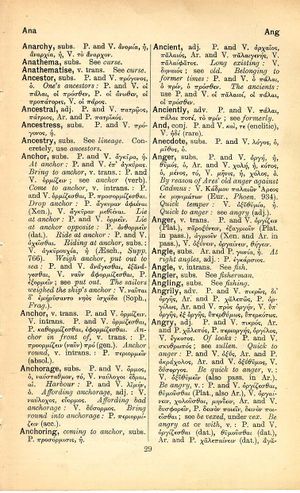anger: Difference between revisions
From LSJ
δι' ἐρημίας πολεμίων πορευόμενος → he marched on without finding any enemy, his route lay through a country bare of enemies
(CSV3) |
mNo edit summary |
||
| Line 4: | Line 4: | ||
P. and V. [[ὀργή]], ἡ, [[θυμός]], ὁ, Ar. and V. [[χολή]], ἡ, [[κότος]], ὁ, [[μένος]], τό, V. [[μῆνις]], ἡ, [[χόλος]], ὁ. | P. and V. [[ὀργή]], ἡ, [[θυμός]], ὁ, Ar. and V. [[χολή]], ἡ, [[κότος]], ὁ, [[μένος]], τό, V. [[μῆνις]], ἡ, [[χόλος]], ὁ. | ||
[[by reason of Ares' old anger against Cadmus]]: V. Κάδμου παλαιῶν [[Ἄρεος]] ἐκ μηνιμάτων (Eur., ''Phoen.'' 934). | |||
[[quick temper]]: V. [[ὀξυθυμία]], ἡ. | |||
[[quick to anger]]: see [[angry]] (adj.). | |||
'''v. trans.''' | '''v. trans.''' | ||
Revision as of 09:02, 23 September 2019
English > Greek (Woodhouse)
subs.
P. and V. ὀργή, ἡ, θυμός, ὁ, Ar. and V. χολή, ἡ, κότος, ὁ, μένος, τό, V. μῆνις, ἡ, χόλος, ὁ.
by reason of Ares' old anger against Cadmus: V. Κάδμου παλαιῶν Ἄρεος ἐκ μηνιμάτων (Eur., Phoen. 934).
quick temper: V. ὀξυθυμία, ἡ.
quick to anger: see angry (adj.).
v. trans.
P. and V. ὀργίζειν (Plat.), παροξύνειν, ἐξαγριοῦν (Plat. in pass.), ἀγριοῦν (Xen. and Ar. in pass.), V. ὀξύνειν, ὀργαίνειν, θήγειν.

